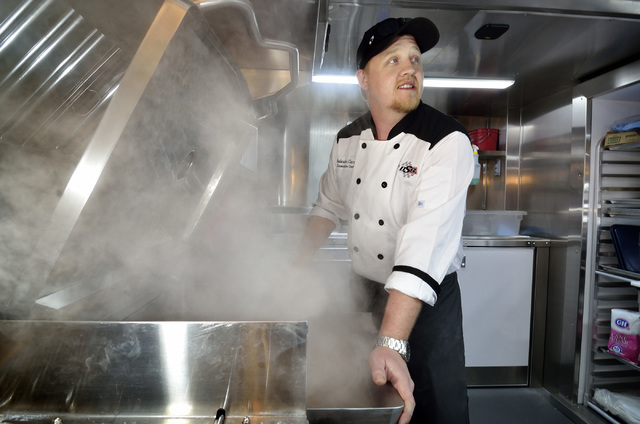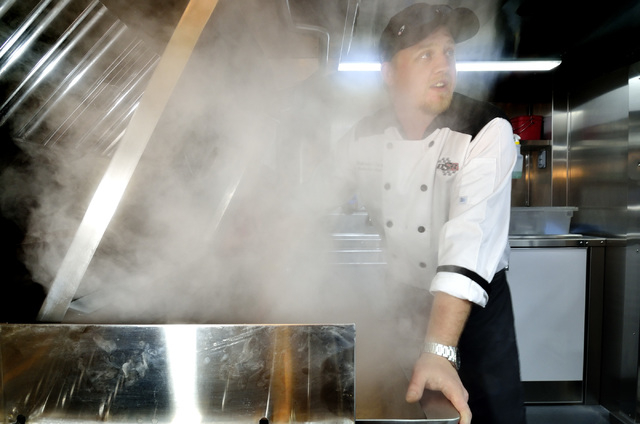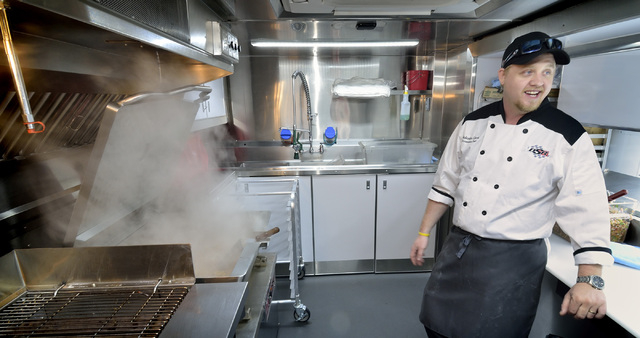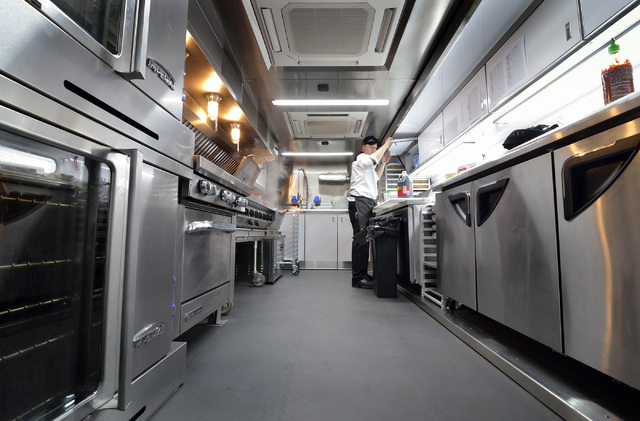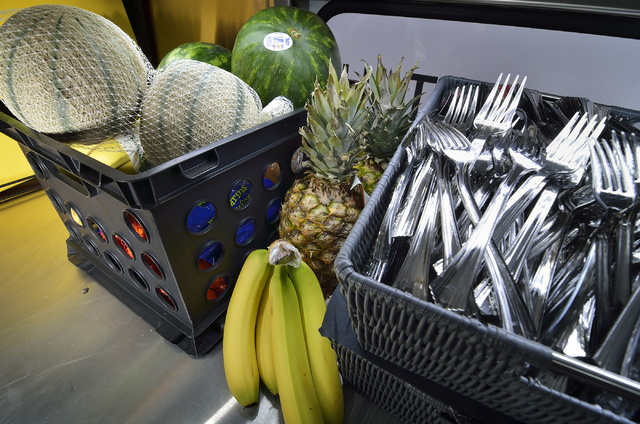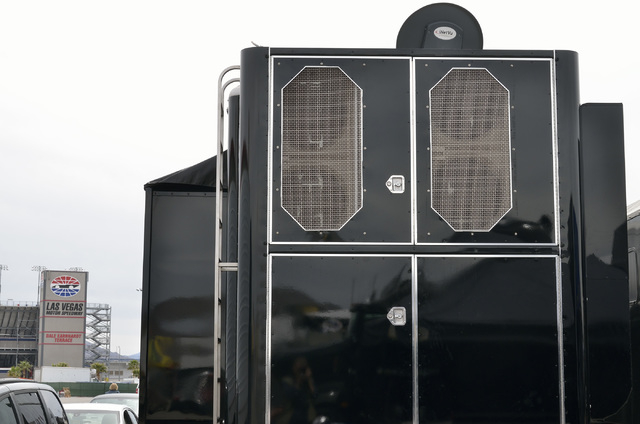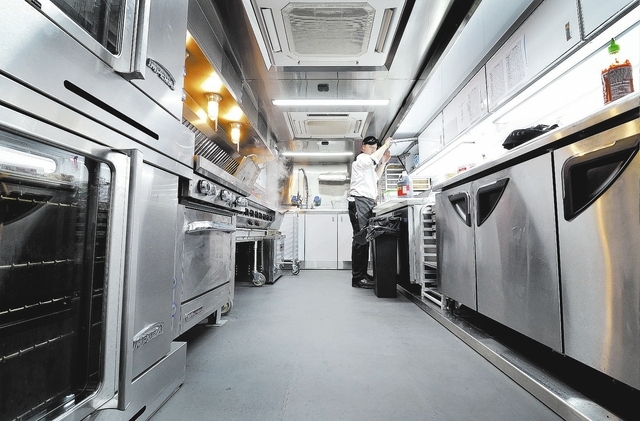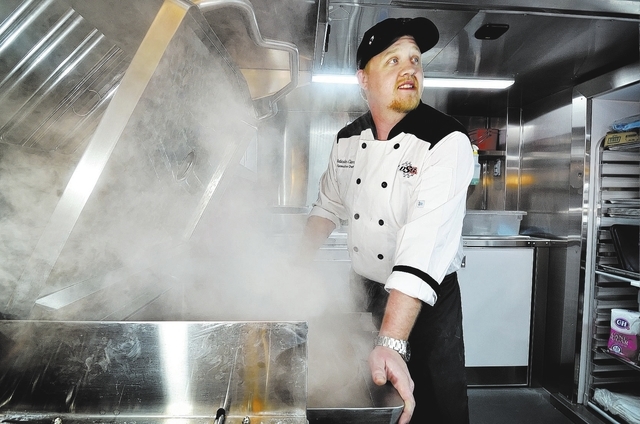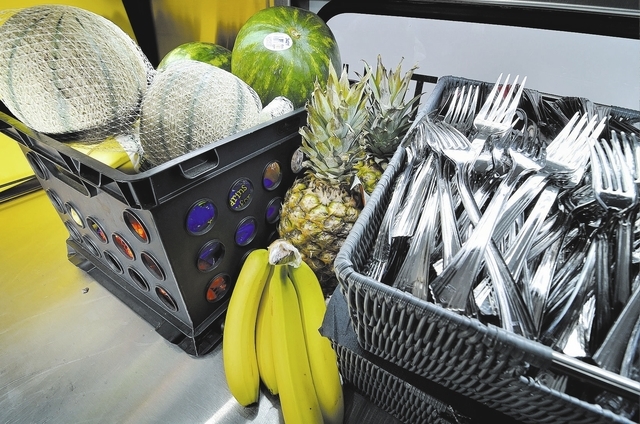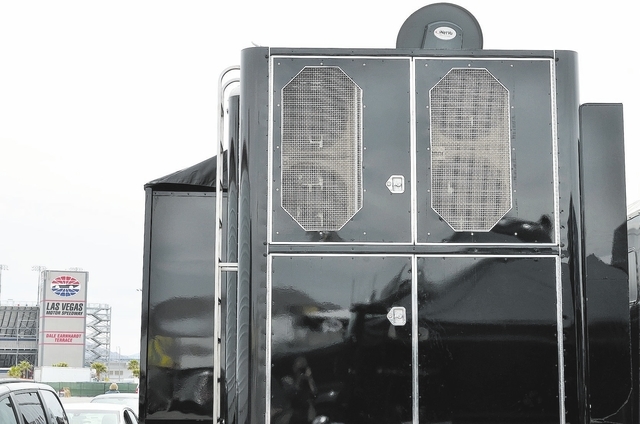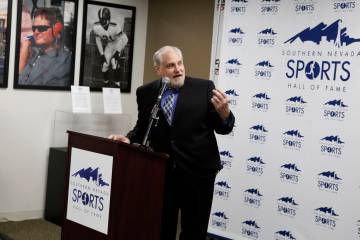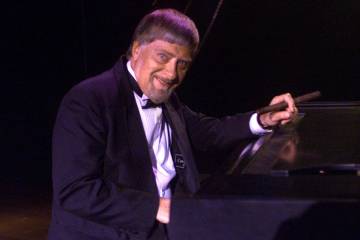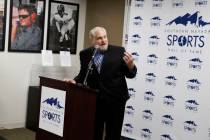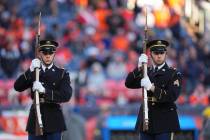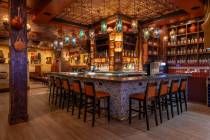NHRA team’s mobile kitchen keeps everyone well fed
Southern Nevadans — motorheads or not — quickly learn to spot the signs that the races are in town. Many more big rigs on the highways than usual. Shinier and glitzier than the average freight-hauling vehicle. Emblazoned with the names of sponsors or teams. Passing one on the freeway, it’s easy to imagine a gleaming, superfast race car inside each of those trailers.
But there may be something else behind the walls of shiny metal: a 53-foot, half-million-dollar kitchen. One that racks up 50,000 miles a year.
The rolling kitchen, which is new this season, is among the 14 Freightliners that the seven teams of Don Schumacher Racing use to travel the NHRA Mello Yello Series circuit. The convoy will hit 24 locations across the country from early February to early November.
At every race, there are a lot of mouths to feed. Besides the drivers and crew, there are all of those sponsors, distributors, vendors, customers, potential etc., who are taken care of as part of business marketing. Other guests include active-duty Army soldiers and recruits, and Make-a-Wish families.
At an average NHRA event, the DSR team feeds 1,500 to 2,000 people over the course of the weekend; in Las Vegas, which draws a smaller crowd, it’s more like 1,000.
Four of the rigs are dedicated to the “hospitality pavilions,” otherwise known as tents, that shelter tables and chairs. At Las Vegas Motor Speedway this weekend, they were between two DSR work areas along Pit Road, which means that those sitting in the pavilions were right next to the pit, getting up-close-and-personal views of the action.
“So you get some really good food, with a little bit of flavoring of nitromethane,” DSR publicist Jeff Wolf quipped.
The food, and the kitchen, are the responsibility of executive chef Malcolm Clark, who’s in his fourth year with DSR. A former chef with the catering operations of the Indianapolis Colts, Clark is used to working with big crowds, though perhaps not in such tight quarters. While he was with the Colts, he had a buddy who was a chef for another team, Alan Johnson Racing.
“He’s got a cool job,” Clark remembers thinking.
After he heard about the DSR opening, so did Clark. And now he’s got a new kitchen.
“It’s a thousand times better than what we had,” he said.
The centerpiece is the tilt kettle, in which Clark was cooking fish for tacos on the day before the races began last week.
“That’s our pride and joy,” he said of the device. “Without it, we’d be dead in the water.”
The tilt kettle is sort of a big square tub that functions as a combination skillet/Dutch oven and can cook up to 40 pounds of food at a time, he said. There’s also a grill and double-stacked ovens, though no dishwasher (“That’s me,” quipped sous chef Riley Horrall). Besides Clark and his sous chef, three or four staff members handle garde-manger work such as the paring of fresh fruits and vegetables.
Food must be sourced at every race location. Clark said he relies heavily on distributors like Sysco, as well as Sam’s Club and some local markets, the latter usually for small quantities of things such as spices.
“It’s trial and error,” he said, which comes about through talking with other teams’ chefs, fans and others.
And sometimes supplies come from other sources. Clark said Don Schumacher, an avid deep-sea fisherman, caught the wahoo for the tacos. (For races in Gainesville, Fla., the week before, Schumacher supplied 1,200 pounds of wahoo caught by him and his friends, Wolf said.) He also tries to reflect regional cuisines.
“Up in Seattle, I love the fisherman’s wharf,” Clark said.
He said he comes up with a different menu each weekend and has to cater to different tastes.
“The teams want small, easy stuff like hot dogs, hamburgers and tacos,” Clark said. “Don and the sponsors like high-end food.”
The Las Vegas menu included an extensive nacho bar with fruit cocktail on Friday. Saturday’s menu involved more formal dishes, including roast beef, roast turkey and a spring salad. Clark seemed especially proud of a new addition to the lunch menu, a maple-balsamic-marinated steak with blue cheese.
The chef flies to and from race locations. His kitchen, the hospitality equipment, the crews and other employees — and, of course, the cars — are trucked from place to place. From Gainesville, they moved to Las Vegas, then back to Charlotte, N.C.; Houston; Atlanta; Topeka, Kan.; back to New Jersey and on and on. Collectively, Wolf said, DSR’s vehicles drive about 900,000 miles a year.
Not counting the tracks.
Contact reporter Heidi Knapp Rinella at hrinella@reviewjournal.com or 702-383-0474.



